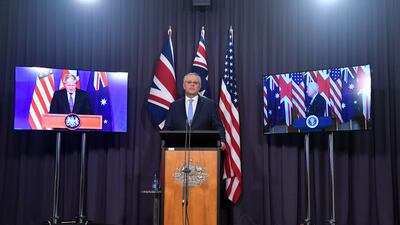The deepening fallout between Britain and France over the signing of a controversial new submarine deal with Australia threatens to create a serious rift at the heart of the Nato alliance.
As Britain and France constitute the two major European military powers in Nato, the alliance relies heavily on the long-standing co-operation between London and Paris to maintain its effectiveness.
But Britain’s involvement, together with the US, in creating a new security alliance with Australia, known as Aukus, aimed at providing the Australian navy with a new fleet of nuclear submarines, has caused a major diplomatic rift between London and Paris.
The French government has reacted angrily to the creation of the new alliance, which was negotiated in secret and announced by the White House last week, as it has led to Canberra cancelling a £47 billion ($64.5bn) deal to buy 12 French diesel-electric submarines.
Even though the French deal, which was originally signed in 2016, was well behind schedule, Paris has reacted with fury to its cancellation, with French President Emmanuel Macron signalling his displeasure at the weekend by taking the unprecedented step of recalling France’s ambassadors to Australia and the US.
At the same time, France has been highly critical of Britain’s role in creating the new alliance, referring to the agreement as “treason” and denouncing Britain as a “vassal state” of the US.
Now the French government has gone a step further in escalating its stand-off with Britain by cancelling a planned summit due to be held this week between Florence Parly, the French armed forces minister, and British defence minister Ben Wallace.
Tensions were already running high between Britain and France over the continuing fallout from Brexit, with Britain accusing France of not doing more to prevent waves of illegal immigrants travelling from France to Britain, France’s insistence that the British government maintains its commitment to the controversial Northern Ireland trade protocol and fears that France is trying to undermine London’s status as a global financial hub.
Paris has also been accused of engineering Britain’s removal from the European Union’s Galileo GPS satellite project despite the fact that London has already contributed around £1 billion to the system’s development costs.
There are now deepening concerns that the row over the Australian submarine deal will lead to a further deterioration in relations between the two countries which could have long-term implications for the future of the Nato alliance.
Aukus pact fall out continues - in pictures
Military co-operation between France and Britain, which was formalised by the Lancaster House treaties on defence and security co-operation in 2010, is considered a vital element of Europe’s contribution to the Nato alliance.
The strength of that bond, however, will come under increased scrutiny in the wake of the Aukus pact as France backs attempts by the EU to create an independent defence and security force to rival Nato.
The creation of an independent EU defence force has been mooted for many years, but has failed to generate much momentum because of objections raised by Britain, as well as a number of member states in Eastern Europe.
But with Britain no longer able to influence EU debates over future defence policy, Brussels has revived plans to develop its own military capabilities to enable it to act independently of Nato. Speaking in the aftermath of the Biden administration’s disastrous mishandling of the US military withdrawal from Afghanistan, EU President Ursula von der Leyen called for the EU to develop its own force that would enable it to intervene militarily without Nato. The plan will be discussed in more detail at an EU defence summit that France is due to host next year.
And so long as tensions persist between London and Paris over the Aukus pact, the prospect of the EU setting up its own, independent force will grow, a move that could have serious implications for Nato's future.








